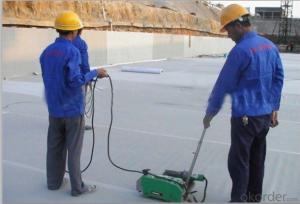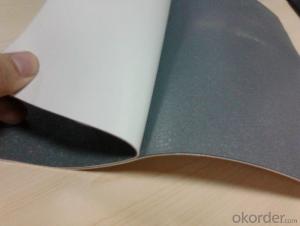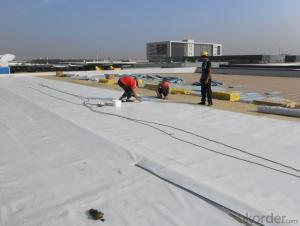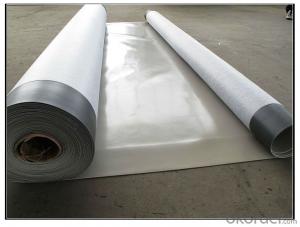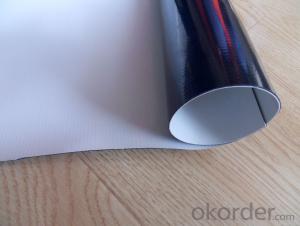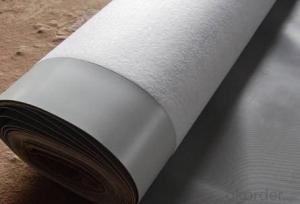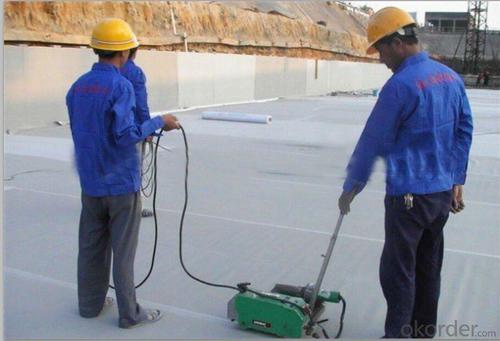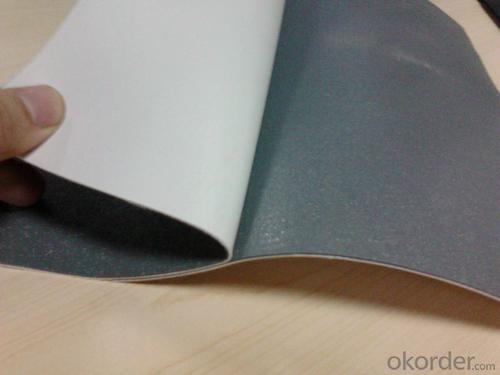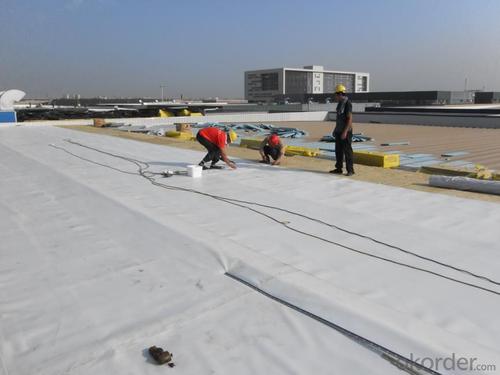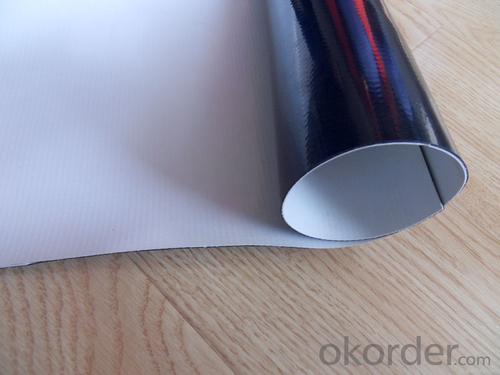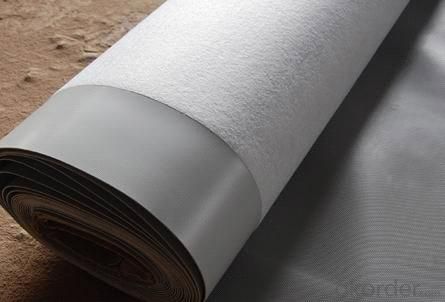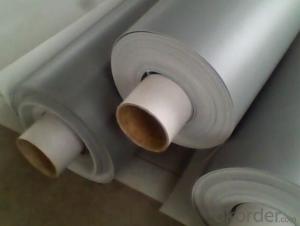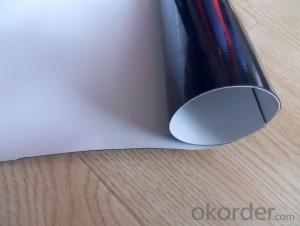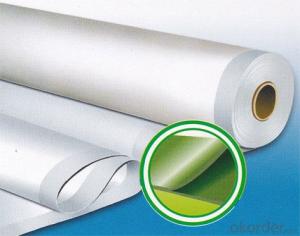PVC Waterproofing Sheets in 1.0mm with Polyester Reinforcement
- Loading Port:
- Shanghai
- Payment Terms:
- TT OR LC
- Min Order Qty:
- 20000 m²
- Supply Capability:
- 5000000 m²/month
OKorder Service Pledge
OKorder Financial Service
You Might Also Like
PVC Waterproofing Sheets in 1.0mm with Polyester Reinforcement
Product Description of PVC Waterproofing Sheets in 1.0mm with Polyester Reinforcement:
PVC Membrane Waterproof /Waterproofing membrane For Roof is a new polymer waterproof membrane. The PVC Membrane Waterproof /Waterproofing membrane For Roof raw material is polyvinyl chloride resin, mixed with plasticizer, filler, antioxygen, ultraviolet absorber and other auxiliaries.
Thickness: 1.2mm/1.5mm/1.8mm/2.0mm
Width:2050mm
Length:20m( Special specifications can be customized)
Size: 2.05mx20m
Color: white/grey, or any other colors.
Features of PVC Waterproofing Sheets in 1.0mm with Polyester Reinforcement:
1. Excellent anti-aging property.
2. Puncture- resistant.
3. Welding construction,
4. High tensile strength, good elongation, good dimensional stability.
5. Good plasticity.
6. It has self-extinguishing from fire property.
7. Materials surface is smooth, fast color, stain resistance.
8. More wide, Wastage become less when being used.
Classification of PVC Waterproofing Sheets in 1.0mm with Polyester Reinforcement:
1. N: Homogeneous PVC membrane
2. L: PVC membrane with fabric backing
3. W: Reinforced PVC membrane
Advantage of PVC Waterproofing Sheets in 1.0mm with Polyester Reinforcement:
1.) Mixing automation. Apply automatic temperature control automatic time control and automatic feed control.
2.) Extrusion equipment uses twin screw coextrusion. Screw temperature uses computer automatic temperature control system.
3.) Handpiece uses large width didhead extrusion equipment.
4.) Sophisticated three-roller calender equipment. The space between equiment is controlled by automation system.
Technical Data of PVC Waterproofing Sheets in 1.0mm with Polyester Reinforcement:
No. | Item | Model Ⅱ | |
1 | Tensile Strength Mpa ≥ | 12.0 | |
2 | Elongation at break% ≥ | 250 | |
3 | Shrinkage rate % ≤ | 2.0 | |
4 | Flexibility at low temperature | No crackle at -25oC | |
5 | Water tightness | Watertight | |
6 | Puncture resistance | Watertight | |
7 | Heat aging treatment | Appearance | Free from bubble, crack, cohesion and void |
Change rate of tensile strength % | +20oC | ||
Change rate of elongation at break | |||
Flexibility at low temperature | No crack at -20oC | ||
8 | Chemical corrosion resistance | Change rate of tensile strength % | +20 |
Change rate of elongation at break | |||
Flexibility at low temperature | No crack at -20oC | ||
9 | Artificial weathering | Change rate of tensile strength % | +20 |
Change rate of elongation at break | |||
Flexibility at low temperature | No crack at -20oC | ||
Application of PVC Waterproofing Sheets in 1.0mm with Polyester Reinforcement:
1) All kinds of roofs, such as steel structure roof, planted roof etc.
2) Underground engineering, such as building basement, subways, tunnels, air raid shelter, etc.
3) Other projects like artificial lake, dam, water reservoir, grain storehouse, etc.
Images of PVC Waterproofing Sheets in 1.0mm with Polyester Reinforcement:
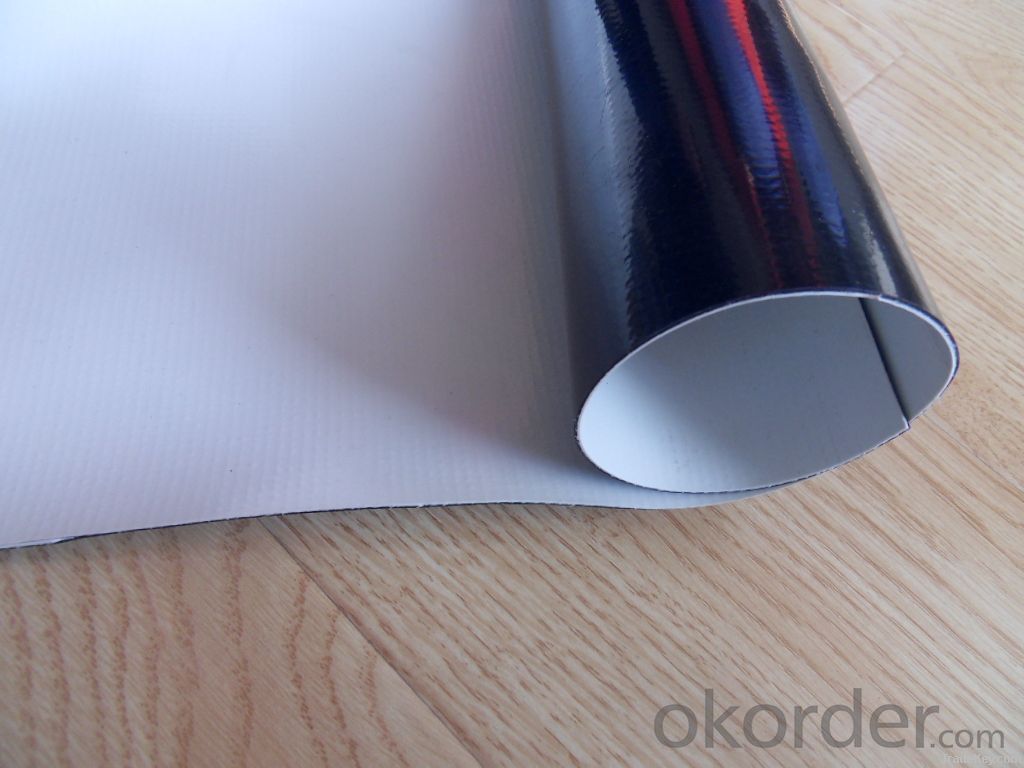
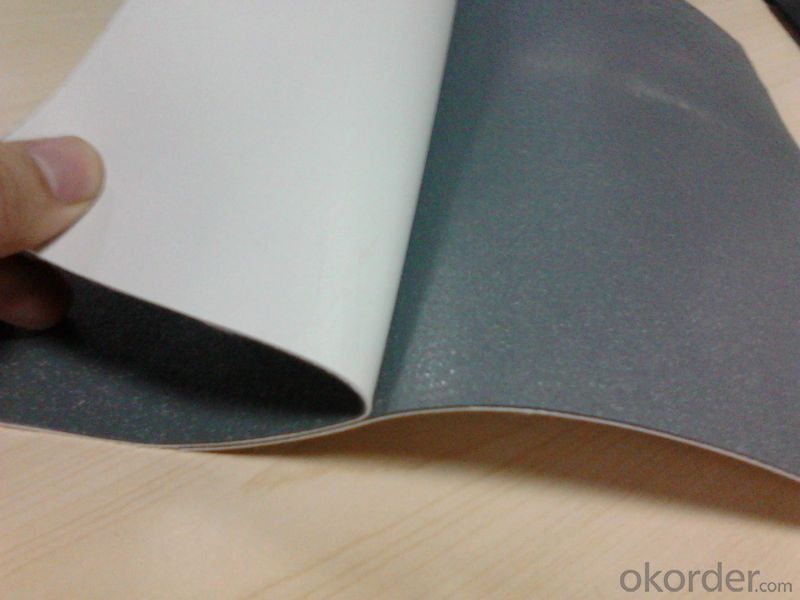
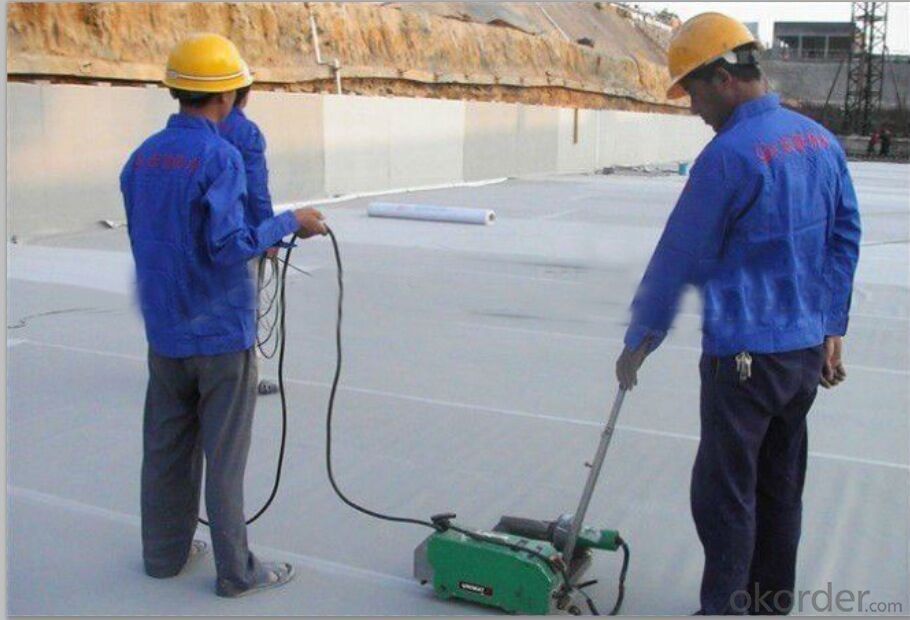
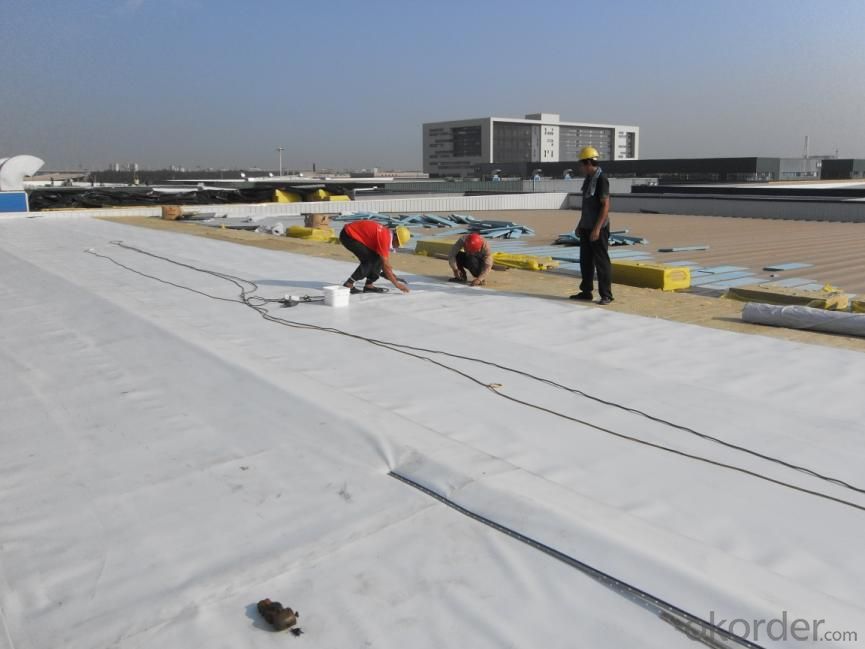
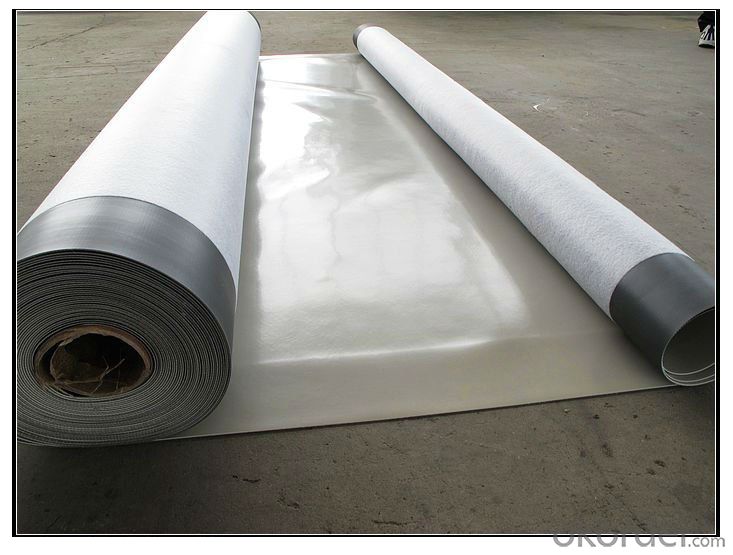
FAQ:
1. Can you produce 4m width?
Yes, no problem for us. We have four bases in China, largest one in this field.
2. How many quantity in one 20'' container for 1.2mm and 1.5mm?
480rolls, 11520m2 for 1.2mm and 400rolls, 9600m2 for 1.5mm
3. Can you provide free samples?
Yes, our samples are free, but express fees usually on buyer's account.
- Q: Can waterproofing membranes be applied over existing surfaces?
- Yes, waterproofing membranes can be applied over existing surfaces. In fact, this is a common practice in construction and renovation projects. Waterproofing membranes are designed to provide a protective barrier against water infiltration, and they can be applied over various surfaces such as concrete, wood, metal, or even other waterproofing systems. By applying a waterproofing membrane over an existing surface, it helps to prevent water damage, including leaks, mold growth, and structural deterioration. However, it is important to ensure that the existing surface is properly prepared and cleaned before the membrane application to achieve optimal adhesion and performance. Additionally, it is recommended to consult with a professional waterproofing contractor to determine the most suitable membrane type and installation method for the specific project requirements.
- Q: Can a waterproofing membrane be used in conjunction with roofing materials?
- Yes, a waterproofing membrane can be used in conjunction with roofing materials. In fact, it is quite common to use a waterproofing membrane as an added layer of protection for roofs. The membrane is typically applied directly on top of the roofing material, creating an additional barrier against water penetration. This is especially beneficial in areas prone to heavy rainfall or where the roof is exposed to high levels of moisture. The waterproofing membrane helps to prevent leaks, extend the lifespan of the roof, and protect the structure from potential water damage. Additionally, the membrane can also provide added insulation and energy efficiency benefits. Overall, using a waterproofing membrane in conjunction with roofing materials is a wise choice to enhance the waterproofing capabilities and durability of the roof.
- Q: Can a waterproofing membrane be used for a commercial building roof?
- A commercial building roof can indeed utilize a waterproofing membrane. In commercial buildings, it is quite common to employ waterproofing membranes to safeguard the roof against water damage and leaks. These membranes typically consist of synthetic materials like PVC or EPDM, which possess exceptional durability and resistance to water penetration. They are applied to the roof surface as a protective layer, effectively preventing water from infiltrating and causing harm to the structure. Moreover, waterproofing membranes are specifically designed to endure various weather conditions, including intense rain, snow, and UV exposure. This makes them suitable for commercial buildings that are exposed to harsh environmental elements. By utilizing a waterproofing membrane, one can ensure the integrity and longevity of a commercial building roof in an effective and long-lasting manner.
- Q: Does a waterproofing membrane require any protective coatings or sealants?
- In order to enhance its performance and durability, a waterproofing membrane typically needs some form of protective coatings or sealants. While the membrane itself provides waterproofing to some extent, it may not be enough to withstand all environmental conditions or potential damage. To create an extra barrier against water intrusion, UV radiation, mechanical stress, and chemical exposure, it is advisable to apply protective coatings or sealants on top of the membrane. These coatings or sealants also offer additional flexibility, strength, and protection against wear and tear. To determine the suitable type of coating or sealant for the specific membrane and project requirements, it is essential to seek advice from a professional waterproofing specialist.
- Q: Is a waterproofing membrane resistant to saltwater or salt damage?
- Typically, a waterproofing membrane resists saltwater or salt damage. Its purpose is to create a barrier against water and moisture, making it suitable for use in marine environments or coastal areas. These membranes are made from materials that can withstand the corrosive effects of saltwater or salt. To ensure their resistance to saltwater or salt damage, proper preparation and sealing techniques are employed during installation. However, it is important to note that the level of resistance may vary depending on the type and quality of the membrane. Therefore, it is advisable to consult with a professional or the manufacturer to choose the appropriate membrane for the specific application and environment.
- Q: Is a waterproofing membrane resistant to abrasion?
- Yes, a waterproofing membrane is generally designed to be resistant to abrasion. The membrane is typically made of durable materials that can withstand friction and wear, ensuring long-lasting protection against water damage.
- Q: Are waterproofing membranes breathable?
- Yes, waterproofing membranes can be breathable. Breathability refers to the ability of a material to allow air or water vapor to pass through it while still preventing liquid water from penetrating. Many modern waterproofing membranes are designed to be breathable, allowing moisture vapor to escape from within while still keeping out liquid water. This is especially important in applications such as waterproof clothing, outdoor gear, or building materials where moisture control is necessary to ensure comfort and prevent the growth of mold or mildew. Breathable waterproofing membranes typically use advanced technologies such as microporous membranes or coatings that allow water vapor molecules to pass through while blocking larger liquid water molecules.
- Q: Can a waterproofing membrane be used on storage tanks?
- Indeed, storage tanks can benefit from the application of a waterproofing membrane. These specialized membranes serve as a barrier, preventing the infiltration of water or other liquids into the surface they are applied to. By employing such membranes, storage tanks are shielded from the detrimental effects of leaks, corrosion, and moisture-related damage. Numerous industries, including oil and gas, chemical, and water treatment, rely on waterproofing membranes to uphold the durability and longevity of their storage tanks. Furthermore, these membranes can be customized to meet specific requirements, such as resistance to chemicals, UV exposure, or high temperatures, thus making them well-suited for a diverse array of storage tank applications.
- Q: Can a waterproofing membrane be used in crawl spaces?
- Crawl spaces, being susceptible to moisture and water intrusion, can suffer from issues like mold, mildew, and structural damage. For protection against water damage, using a waterproofing membrane is an effective solution. By installing the membrane on the walls and floor of the crawl space, it creates a barrier that keeps moisture out. This is especially useful in areas with high water table levels or frequent flooding. Moreover, the waterproofing membrane not only safeguards the crawl space but also enhances indoor air quality by inhibiting mold growth and reducing allergens. To determine the most suitable waterproofing membrane and installation method for a specific crawl space, it is advisable to seek professional advice as requirements may differ.
- Q: Can waterproofing membranes be used on concrete block walls?
- Yes, waterproofing membranes can be used on concrete block walls. These membranes are specifically designed to prevent water penetration and can effectively protect concrete block walls from moisture damage.
Send your message to us
PVC Waterproofing Sheets in 1.0mm with Polyester Reinforcement
- Loading Port:
- Shanghai
- Payment Terms:
- TT OR LC
- Min Order Qty:
- 20000 m²
- Supply Capability:
- 5000000 m²/month
OKorder Service Pledge
OKorder Financial Service
Similar products
Hot products
Hot Searches
Related keywords
